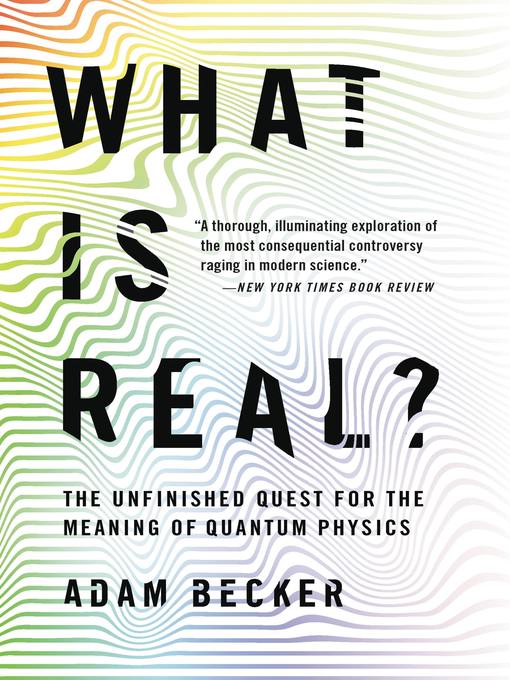
What Is Real?
The Unfinished Quest for the Meaning of Quantum Physics
- اطلاعات
- نقد و بررسی
- دیدگاه کاربران
نقد و بررسی

Starred review from January 29, 2018
Quantum physics is “stubbornly mute on the question” of what is real, writes science writer Becker in this fresh debut. Most physicists in the early 20th century believed quantum physics revealed nothing about the everyday world; it was seen as the “shut up and calculate method.” It’s the dissenters to that view who take center stage here: scientist David Bohm challenged the status quo with his pilot-wave theory in the 1950s; Hugh Everett followed his curiosity to the sci-fi–like “many-worlds” interpretation; and John Stewart Bell’s “scathing critic’s pen” led to his eponymous theorem, later called the “most profound discovery of science.” Catchy chapter openers (“It was the Summer of Love in New York City, and John Clauser was cooped up in a room at the Goddard Institute for Space Studies”) and vivid biographical portraits enliven even dense theoretical explanations with wit and bite. Readers trace decades of experiments, alternative philosophies, and surprising drama in the physics boys’ club to three intriguing possibilities: “Either nature is nonlocal in some way, or we live in branching multiple worlds despite appearances to the contrary”—or quantum physics is incomplete. With his crisp voice, Becker lucidly relates the complicated history of quantum foundations.

February 1, 2018
A historical exploration of quantum physics, which "predicts a stunning variety of phenomena to an extraordinary degree of accuracy."The realm of quantum physics is extremely difficult to comprehend. According to Niels Bohr's "Copenhagen interpretation," largely devised in the 1920s, subatomic particles have no definite properties until they are measured. One can only calculate the probability of a certain result--for example, the location of an electron--and the very act of measurement changes matters. In his first book, astrophysicist and science writer Becker agrees with a minority of physicists that quantum physics needs a better interpretation "because it's not immediately clear what the theory is saying about the world. The mathematics of quantum physics is unfamiliar and abstruse, and the connection between the mathematics and the world we live in is hard to see." Until his death, Einstein insisted that this bizarre picture couldn't be correct, but most colleagues disagreed. Becker summarizes the debate and then takes up the cudgel. Einstein's objections never caught on, but successors have had some success. David Bohm and Hugh Everett maintained that particles have specific properties and location, but they also introduced complex concepts such as nonlocality, hidden variables, and a many-worlds view. The leading genius was John Bell, whose 1964 theorem postulates certain phenomena that violate traditional quantum theory. Subsequent extremely delicate experiments proved him right. Quantum physics works, so most physicists don't concern themselves with its view of reality, and the debate rarely reaches popular media. It's a philosophical question whose major figures are not household names and whose arguments do not simplify matters. The author works diligently to introduce them to a lay audience. Readers must put in the effort, but those who persist will come away with a taste of a basic scientific issue that a century of controversy has yet to resolve.A useful introduction to the history of quantum theory for scientifically inclined readers.
COPYRIGHT(2018) Kirkus Reviews, ALL RIGHTS RESERVED.

April 15, 2018
Astrophysicist and science journalist Becker (visiting scholar, Office for History of Science and Technology, Univ. of California Berkeley) here builds a solid case to counteract the typically prevailing (since the 1930s) notion that the quantum, subatomic world consists of a reality disconnected from our own. His research is as detailed and meticulous as a dissertation, though he includes clear descriptions of quantum phenomena using both texts and illustrations. Yet, the book is also personal, as Becker describes how, along with physicist John Bell, he is working to overturn the Copenhagen Interpretation created by Niels Bohr and Werner Heisenberg, a commonly taught theory of quantum mechanics. The narrative is enlivened by the personalities of key scientists and physicists, such as Albert Einstein's preference for solitude despite being sociable; Werner Heisenberg's hay fever that helped lead him to his uncertainty principle; and, the hero worship of Niels Bohr's students, despite his dense lecturing style. VERDICT This fairly technical work offers a fascinating revision of pivotal decisions around quantum physics discoveries. It should appeal to those interested in physics as well as the history of science in the interwar period.--Sara R. Tompson, Jet Propulsion Laboratory Lib., Archives & Records Section, Pasadena, CA
Copyright 2018 Library Journal, LLC Used with permission.




دیدگاه کاربران